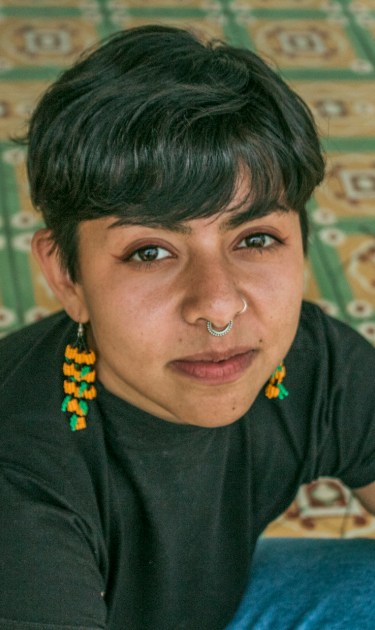Since the beginning, Isabel Ramírez has allowed rage to guide her songwriting. Five years ago, when her solo project La Muchacha began to take form, Ramírez looked inward for clues to the sound she sought to create. She realized she was angry. “I would ask myself, ‘Why do so many things bother me? Why does the news bother me so much?’” the Manizales, Colombia, native tells Remezcla over the phone.
These questions laid the groundwork for her first song “La Serpiente,” a reckoning with femininity, powered by her bellowing voice and the bass of beating drums. Sifting through her thoughts, she discovered an apt metaphor to describe her gender expression as she saw it—a serpent, but not the trickster kind described in the Bible. Rather, a serpent that could give life. “Everything started there,” Ramírez says. “That’s when I started singing about things that bother me and the sociopolitical reality in which we live.”
In the span of a few years, Ramírez has made a career for herself singing about topics most local musicians steer clear of. Her three albums—the latest of which, More Raw Songs, was released this year—follow her brand of confrontational lyrics, paired with an acoustic guitar and folkloric rhythms. The songs are bold and unafraid to dive into the social crises that afflict Colombians. In “Canto Páramo,” off her first album Polen, she addresses the president directly when she says, “Don’t tell me my páramo is for sale,” referencing a vulnerable highland ecosystem endemic to the Andes Mountains. Then, “Canción de un Hecho Confuso,” a cut from her latest album, describes how over a span of a few decades—but especially between 2002 and 2008—civilians were lured and extrajudicially killed by the army in a tragic episode of the country’s armed conflict.
These songs emerged as Ramírez questioned her beliefs and reflected upon a personal stance. But in the midst of Colombia’s recent national strike, they echoed with thousands of protesters who voiced their discontent with the government over an unfair tax reform on the streets. In four months of upheaval, Ramírez’s biting lyrics and defiant cry became the soundtrack of an uprising. Her songs turned up at blockades, marches, and vigils, as ubiquitous as the protester chants and police fire. Then, organizers sought her out directly to sing at protest sites. “I never expected it,” says Ramírez. “But I feel good about it. It’s my way of supporting the struggle and contributing to the cause based on what I do.”

“I never expected it. But I feel good about it. It’s my way of supporting the struggle and contributing to the cause based on what I do.”
At the height of the protests, it was her single “No Azara,” released in late May, that launched her into stardom. A moving folk song, the hit is based on the peace activists of San José de Apartadó, in northwestern Colombia, who face the constant threat of right-wing paramilitaries. Loosely based on the stories laid out in the documentary Chocolate of Peace, Ramírez embodies the voice of the protagonist on the track: “Let them [shoot me] at the door of my house because I’m dying on my land, and from this land, I’m not leaving.”
It’s her never-back-down attitude and her empathy for forgotten communities that have made her something of a protest music icon in Colombia—a disciple of the South American artists Violeta Parra and Mercedes Sosa, both sources of inspiration and admiration for Ramírez.
Yet, after three albums, Ramírez indicates there’s room for change. Her next album, which is still unnamed, is expected to interrogate her dark side, her mysticism, and her personal relationships. Her latest single, “Se Va, Se Va,” a duet with fellow Colombian singer Briela Ojeda laments the departure of a lover and is a peek of what’s to come.





